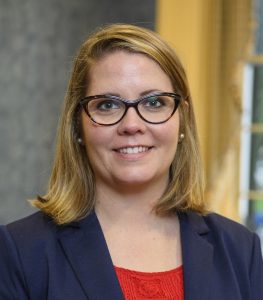OXFORD, Miss. – As the COVID-19 pandemic continues to upend life in cities across the world, a University of Mississippi sociologist is focusing on the current and potential impact of the virus on rural communities across the South
Anne Cafer, assistant professor in the Department of Sociology and Anthropology, is a researcher in rural health care and also serves as an affiliate at the Center for Population Studies and as a coordinator of the university’s Applied Policy and Community Research Laboratory. Last year, she received an Andrew Carnegie Fellowship for $200,000 to support her research on health inequality and community resilience, focusing on rural communities in Mississippi.
Cafer has published 18 studies in peer-reviewed academic journals and has co-authored reports on public health care that help inform government policy in states across the country.
According to the Mississippi Department of Health, the number of Mississippians infected with COVID-19 rose to 2, 942 on April 12, with 161 new cases reported that day. Several cities within the state have been identified as “hot spots” by the Centers for Disease Control.
Cafer recently co-authored a research brief about the potential impact of COVID-19 on the rural South with Meagen Rosenthal, assistant professor of pharmacy administration in the Ole Miss School of Pharmacy. Drawing on their work, Cafer explains why Mississippi is particularly vulnerable to COVID-19:
Q: Why did you think it was important to write a research brief focusing on COVID-19 in the rural South?
A: As we continually update numbers for current cases and testing, we realized that Southern, rural communities, which I study, are at particular risk.
Q: Why is the rural population of the South projected to experience a disproportionate number of COVID-19 cases compared with other regions of the country?
A: In many small towns, the young people have moved away, and a majority of people remaining are elderly and tend to have more underlying health problems such as diabetes and respiratory disease.
Q: Are there any other factors that affect both elderly people and younger people in the rural South and make them vulnerable to becoming seriously ill with COVID-19?
A: First of all, there are a disproportional number of people of all ages who are obese and diabetic – which are two related health problems, and this includes younger people. In addition, there are many fewer health care facilities across the rural South, and particularly in Mississippi, than there are in other parts of the country.
When people get sick, they have far fewer options for care including places to go, like hospitals, and there are not enough doctors and nurses. They also have fewer public health officials to educate them about the pandemic.
Q: How does Mississippi’s testing compare to the rest of the country?
A: To date, the number of tests being administered here are 35 percent below the national average, according to the Centers for Disease Control and Prevention. That means that we are undertesting and underdiagnosing the number of people in the rural South who have COVID-19.
Q: Is there anything in particular that Mississippians should know when they are looking at national data about COVID-19?
A: You cannot just look at the numbers. Of course, we have fewer cases than some other Southern states, such as Georgia and Florida, because we have fewer people. You have to look at percentages of population. According to data released this week, we have proportionately more cases than many other Southern states. And, remember, because we are testing less than those states, the number of COVID-19 cases in reality is much higher than reported.
Q: What can Mississippians do to protect themselves?
A: Follow the Centers for Disease Control guidelines and stay informed. We have to look to scientists for our information and recommendations – not to people who are amateur experts, whether we know them personally or see them in the media. There are no miracle cures for COVID-19.
Be aware that you may not have symptoms, but you can still be a carrier and infect other people, including family members. Social distancing to prevent widespread transmission of infection is key.
